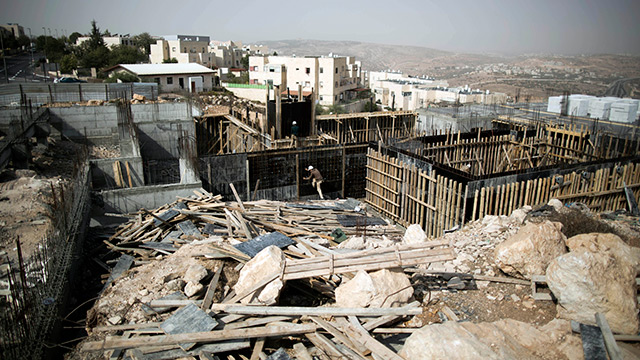SUMMARY
This is AI generated summarization, which may have errors. For context, always refer to the full article.

JERUSALEM – Israel’s announcement that it plans to build 1,500 new settler homes in occupied east Jerusalem after freeing 26 Palestinian prisoners is destroying the peace process, the Palestinian Authority said Wednesday, October 30.
Plans to build the homes in the city’s Arab sector came to light almost immediately after Israel began freeing 21 prisoners to the West Bank and another 5 to the Hamas-run Gaza Strip overnight.
The sequence was almost a mirror image of August 13, when a first tranche of 26 prisoners was freed and Israel announced construction of more than 2,000 new settler homes, mostly in east Jerusalem.
Palestinian president Mahmud Abbas’s spokesman, Nabil Abu Rudeina, said the move “destroys the peace process and is a message to the international community that Israel is a country that does not respect international law.”
And a statement from the presidency said it “leads the Palestinian and Arab parties to lose confidence that this (Israeli) government will make peace,” the official WAMA news agency reported.
“All settler activities are illegal and no settlement will remain on Palestinian soil,” it added.
Earlier, a senior official told Agence France-Presse that Prime Minister Benjamin Netanyahu and Interior Minister Gideon Saar had “agreed on 4 building plans in Jerusalem.”
The announcement was timed to trump headlines focusing on the celebrations in the West Bank and Gaza after the prisoners walked free into their respective home territories shortly after 1:00 am (2300 GMT).
In the West Bank, thousands of cheering people turned out to welcome home the 21 prisoners, who were tasting freedom for the first time in 20 years or more, in a formal ceremony at Abbas’s presidential compound in Ramallah.
Tearful reunion with relatives
After a tearful reunion with relatives, many of them were carried through the crowds on people’s shoulders, their hands held aloft in victory.
“There will be no (peace) agreement if so much as one Palestinian prisoner remains behind bars,” Abbas told the excited crowd, referring to the 5,000 or so inmates Israel is still holding.
In Gaza, the 5 long-term ex-detainees were met by hundreds of relatives and well-wishers as they emerged through the Erez crossing and entered the Strip, sparking energetic celebrations late into the night.
The move to ramp up settlements was mooted last week by a senior Israeli official who said it had been coordinated in advance with the Palestinians and the Americans.
But Abbas, speaking shortly before the Israeli announcement, flatly denied that.
“There are some living among us who say that we have a deal (to release prisoners) in exchange for settlement building, and I say to them, be silent,” he said.
All 26 prisoners were convicted of killing Israelis, with most of the attacks occurring before the 1993 Oslo accords, which granted the Palestinians limited self-rule but failed to usher in an independent state.
Earlier this year, Netanyahu agreed to release 104 prisoners in stages in a move that facilitated a return to direct talks in late July, ending a 3-year hiatus.
The first batch was freed on August 13, and a 3rd release of another 26 inmates is planned for December, Palestinian officials said. The final group is to be freed in March.
The peace talks are being conducted under a US-imposed media blackout, but a senior Palestinian official said Tuesday that Israel had adopted hardline positions and negotiations had so far produced “no tangible progress.”
“The current Israeli negotiating position is the worst in more than 20 years,” said Yasser Abed Rabbo, secretary general of the Palestine Liberation Organisation.
The prisoner release has sparked tensions within Netanyahu’s coalition, with the premier describing the decision to free them as “one of the most difficult” he had ever made.
Defence Minister Moshe Yaalon expressed similar sentiments.
“In recent months we have been facing sensitive diplomatic circumstances and weighty strategic considerations which require us to take difficult and painful steps,” he said Tuesday.
“It is not a black and white situation. It is highly complex and obliges us to be prudent and responsible, to see also the long view.” – Rappler.com
Add a comment
How does this make you feel?
There are no comments yet. Add your comment to start the conversation.